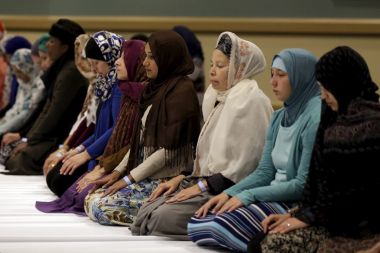Six facts about Islam in the US

In 2010, the majority of Americans admitted that they knew very little about Islam. Negative rhetoric around Muslims has worsened in the run up to next year's presidential election, particularly in light of comments made recently by leader of the Republican race, Donald Trump.
He has been condemned for backing his call to ban Muslims from entering the US with statistics from controversial think tank the Center for Security Policy. On Monday, Trump cited a poll from the organisation that claims 51 per cent of Muslims in America believe they should have the choice of living under Islamic law, and that a quarter believe violence against America is justified "as part of the global jihad".
The Center for Security Policy has since been discredited as a reputable source. According to the BBC, the heads of organisations which monitor extremist groups have branded it "an extremist think-tank", and founder Frank Gaffney Jr an anti-Muslim conspiracist.
Here are six facts about Islam around the world, as found by the Pew Research Center.
1. Islam is the fastest growing religion in the world. Estimated figures in 2010 put the global Muslim population at 1.6 billion. In April of this year, it was announced that Islam was the fastest growing religion in the world, and if present rates continue, the number of Muslims will equal the number of Christians in the next 35 years for the first time in history.
2. But Muslims currently make up less than 1 per cent of the US adult population. Just 0.9 per cent of US adults identified themselves as Muslims in a 2014 Pew study, though this is expected to double by the year 2050.
3. Almost half of US Muslims believe their leaders should speak out more about Islamic extremism. Muslim leaders have not done enough to publicly condemn extremism, according to 48 per cent of the US Muslim population in a 2011 study.
4. The majority of Muslims lean to the left. Perhaps unsurprisingly given the rhetoric of Trump et al (though, notably, a number of leading Republicans have criticised Trump's more recent remarks), 70 per cent of Muslims identify or lean toward the Democratic Party.
5. Muslims are not perceived warmly by the US public. A survey in 2014 found that when asked to rate their perceptions of various religious groups on a 'feeling thermometer', 41 per cent of the US public rated Muslims in the coldest part. Over all, Muslims fared worse than every single other religious group (Jews, Catholics, Evangelical Christians, Hindus and Mormons). They were also viewed more coldly than atheists.
6. The vast majority of Muslims reject religious extremism. In 2013, a global study found that the majority of Muslims reject violence in the name of Islam, including 91 per cent in Iraq and 92 per cent in Indonesia, both of which have a Muslim-majority population. In the US, 86 per cent of Muslims said suicide bombings and other forms of violence against civilian targets are never or rarely justified. Just 3 per cent of Muslims worldwide said they are often justified.











